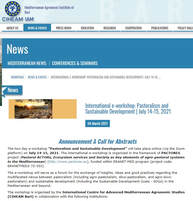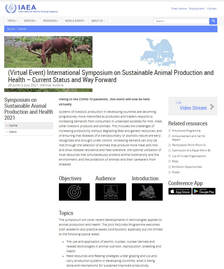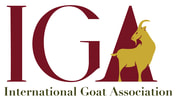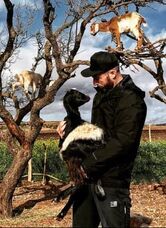|
Dr María Rosa Caro, an internationally renowned expert on chlamydia from the University of Murcia, offers an in-depth analysis of the past and present of these vaccines and the keys for obtaining the ideal vaccine against Chlamydia abortus. In the video, Dr Caro outlines some of the main drawbacks of live attenuated vaccines:
0 Comments
Written by Souleymane Traoré, Richard B. Yapi, Kadiatou Coulibaly, Coletha Mathew, Gilbert Fokou, Rudovick R. Kazwala, Bassirou Bonfoh, and Rianatou Bada Alambedj
Abstract Mali has a high pastoral potential with diverse coexisting production systems ranging from traditional (nomadic, transhumant, sedentary) to commercial (fattening and dairy production) production systems. Each of those systems is characterised by close interactions between animals and humans, increasing the potential risk of transmission of zoonotic diseases. The nature of contact network suggests that the risks may vary according to species, production systems and behaviors. However, the study of the link between small ruminants and zoonotic diseases has received limited attention in Mali. The objective of this study was to assess brucellosis seroprevalence and determine how the husbandry systems and human behaviour expose animal and human to infection risk. A cross-sectional study using cluster sampling was conducted in three regions in Mali. Blood was collected from 860 small ruminants. The sera obtained were analysed using both Rose Bengal and cELISA tests. In addition, 119 farmers were interviewed using a structured questionnaire in order to identify the characteristics of farms as well as the risk behaviors of respondents. Husbandry systems were dominated by agro-pastoral systems followed by pastoral systems. The commercial farms (peri-urban and urban) represent a small proportion. Small ruminant individual seroprevalence was 4.1% [2.8–5.6% (95% CI)]. Herd seroprevalence was estimated at 25.2% [17.7–33.9% (95% CI)]. Peri-urban farming system was more affected with seroprevalence of 38.1% [18.1–61.5 (95% CI)], followed by pastoral farming system (24.3% [11.7–41.2 (95% CI)]). Identified risk behaviors of brucellosis transmission to animals were: exchange of reproductive males (30.2%); improper disposal of placentas in the farms (31.1%); and keeping aborted females in the herd (69.7%). For humans, risk factors were: close and prolonged contact with animals (51.2%); consumption of unpasteurized dairy products (26.9%); and assisting female animals during delivery without any protection (40.3%). This study observed a high seroprevalence of brucellosis in small ruminants and also identified risky practices that allow cross transmission between the two populations. This calls for control strategy using a multi-sectoral and multidimensional approach. Una gran serie de videos informativos de IGA Sudamerica
https://www.youtube.com/channel/UCRxTexYkG1z5Pk9x9AvZTaA/videos.  Announcement & Call for Abstracts The two-day e-workshop “Pastoralism and Sustainable Development” will take place online (via the Zoom platform) on July 14-15, 2021. The international e-workshop is organized in the framework of PACTORES project (Pastoral ACTORs, Ecosystem services and Society as key elements of agro-pastoral systems in the Mediterranean) (http://www.pactores.eu), funded within ERANET-MED program (project code: ERANETMED2-72-303). The e-workshop will serve as a forum for the exchange of insights, ideas and good practices regarding the multifaceted nexus between pastoralism (including agro-pastoralism, silvo-pastoralism, and agro-silvo-pastoralism) and sustainable development (including the Sustainable Development Goals - SDGs) in the Mediterranean and beyond. Dear colleagues, We are happy to announce that the abstract submission to the ISVA Virtual Meeting - International Sheep Veterinary Association (23rd-25th November 2021), is now open. Please visit the Meeting website and submit your abstract. You are kindly asked to be aware of the important dates. Join us virtually for a successful ISVA Meeting! Main Topics
Important dates to remember
We would like to thank you in advance for your participation and we remain at your disposal for any further information you may need.
Stay healthy and ‘see’ you at ISVA2021! TECHNICAL SECRETARIAT C/Marià Cubi, 4. - Pral. | 08006 Barcelona (SPAIN) Tel. +34 932.388.777 www.isva-virtual2021.com [email protected] Recently, several concerned IGA members received fake emails from IGA Board Officers. We care about our members and want to protect you from these “phishing” attempts. Phishing is a fraudulent attempt to get personal information from you. The most common message we have seen is a “spoofed email.” The message claims to be from someone at IGA but provides false and misleading information. Typically, the email claims to be urgent, asks for help with a problem, and wants you to respond by email. Here is an example of what we have seen. If you suspect an email you have received is suspicious, hover your cursor on the sender’s name. In this case, Beth Miller and the sender’s email will show as in the example below. If you do not recognize the sender’s email address, it is most probably a phishing attempt. EXAMPLE This email is not from Beth. The email address is clearly wrong. Additionally, members of the IGA Board will never ask you for money. We send out reminders for members to renew their memberships, but we will not solicit money from you directly.
If you are ever in doubt about an email, then please contact Christian De Vries directly. Our contact information is located on the bottom of every page on the IGA website, and most responses will be within 24 hours. If you have received phishing emails from people pretending to be an IGA Board member, please send us copies of these fake emails so we can look for new patterns and help with potentially prosecuting the perpetrators in the future. https://www.iga-goatworld.com International Goat Association 12709 Grassy Drive Little Rock, Arkansas 72210 USA email: [email protected] phone: +1-501-454-1641 We have moved the IGA Board, Regional Directors’, and Country Representatives’ emails into the website’s MEMBERS section to prevent further phishing attempts. Only paid members of IGA will have access to this information. Tips you can use to avoid phishing and other scams:
We hope that this information is helpful. Wishing you the best for 2021 and beyond, The IGA team  Country Representative for Argentina Patricio has worked in research, development, training of producers, and training students in goat production for 40 years in ecologically sustainable, economically profitable, and socially acceptable models using a participatory research and experimentation approach encompassing competitive design, sustainability, and equity. He graduated as a Veterinarian in Argentina, trained in the production of small ruminants in arid zones at the Ben-Gurion University of the Negev, Israel, where he was responsible for a sheep and goat production development project involving Bedouin tribes. He completed his graduate studies as a Specialist in Animal Production. Patricio obtained a Master’s of Science degree in Animal Production and a Doctorate in Veterinary Medicine degree in Spain. He was part of the formulation team of the National Law for Goat Development of Argentina and responsible for the drafting of the Meat Sector of the National Goat Program. Patricio is a Principal Investigator of the National Institute of Agricultural Technology and a Professor of the Goat Production and Chair of both the National University of La Pampa and the Juan Agustín Maza University. Finally, Patricio is a husband, father, and grandfather. Want to learn more about our other Country Representatives? Click here. Country Representative for Malta
Darryl graduated with a Diploma in Agriculture from the University of Malta. He obtained a Bachelor of Science Degree in Mediterranean Agro-Ecosystems Management from the same institution and collaborated with the University of Perugia in Italy. Darryl has been in the livestock industry for over ten years. His primary research focuses on the characterization of the indigenous Maltese goat population. His other research interests include the conservation of the endangered indigenous livestock breeds of the Maltese islands, livestock production, animal behavior, and livestock handling. Darryl works as a Principal Agricultural Officer at the Agriculture Centre and Innovation Hub for Malta’s Government. Here he manages herds of indigenous cattle, goats, sheep, and poultry. Part of his responsibility is to oversee the conservation of these indigenous livestock breeds. Darryl is also a part-time lecturer at the MCAST Institute for Agribusiness, teaching livestock production and management expertise in small ruminants. He is the founder and administrator of a voluntary organization named Breeds of Origin Conservancy. This organization was established in 2016, recognizing that conservation of the endemic flora and fauna, indigenous breeds; native species and subspecies; and cultivated varieties of trees and plants is vital to preserving the Maltese biodiversity for economic, social, educational, and cultural purposes. Today, these indigenous breeds, endemic species and subspecies, and cultivated varieties of trees and plants are increasingly threatened through commercial agriculture and consumption habits. Darryl is also a national judge for sheep and goats during Malta’s annual agricultural show, called Imnarja. Want to learn more about our other Country Representatives? Click here. Why do animals — including people — behave the way they do?
That's a question long pondered by researchers. A new study on this pressing topic, published this month in Royal Society Open Science, reveals an interesting insight into goats — and perhaps humans as well. Daniel Sankey, who researches animal behavior at the University of Exeter in the United Kingdom, and Andrew King, associate professor of biosciences at Swansea University in Wales, wanted to follow up on a classic 1996 study of buffalo that drew a rather surprising conclusion (at least to those who don't give much thought to animal behavior).  28 June - 2 July 2021, Vienna, Austria Owing to the COVID-19 pandemic, this event will now be held virtually. Systems of livestock production in developing countries are becoming progressively more intensified as producers and traders respond to increasing demands from consumers in urbanized societies for milk, meat, other livestock products and animals. This includes the challenges of increasing productivity without degrading feed and genetic resources, and of ensuring that diseases of a transboundary or zoonotic nature are early recognized and brought under control. Increasing demand can only be met through the selection of animals that produce more meat and milk and show disease resistance and heat tolerance; the optimal utilization of local resources that simultaneously protects animal biodiversity and the environment; and the protection of animals and their caretakers from diseases. |
IGA Blog
The International Goat Association promotes goat research and development for the benefit of humankind, to alleviate poverty, to promote prosperity and to improve the quality of life. Archives
May 2024
Categories
All
|
|
International Goat Association
2516 Millbrook Rd., Little Rock, AR72227 USA email: [email protected] -454-1641 |





 RSS Feed
RSS Feed